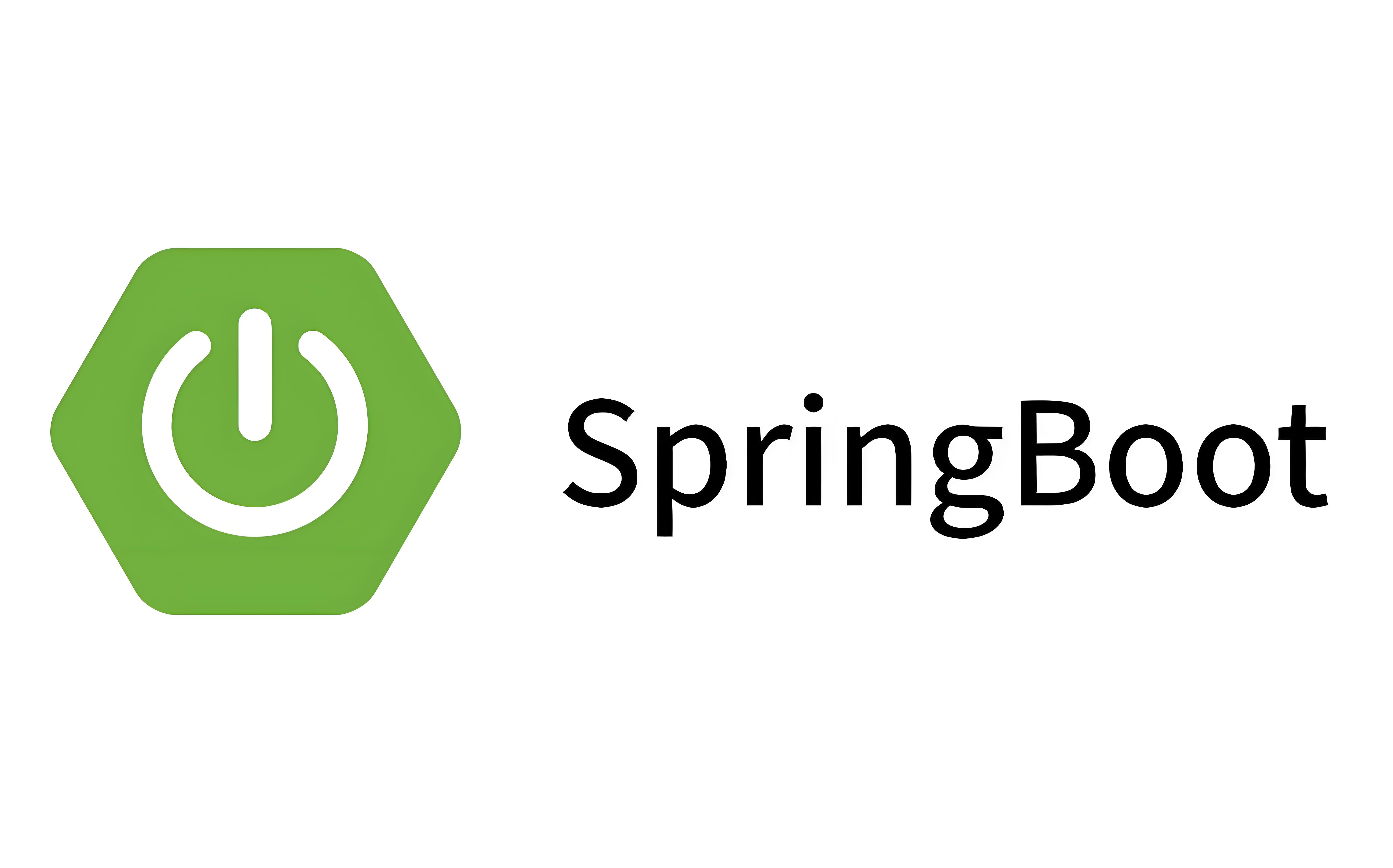前言
我们前面学习了SpingBoot的自动配置原理,知道SpringBoot自动配置依赖于各种定义好的Starter,通过Stater中定义的信息确定是否对各种Bean实例化。学习一下如何实现自定义的Starter,能够加深我们对SpringBoot的理解并且有助于工作中可能使用到的场景。话不多说,直接上步骤
新建项目
创建一个maven的项目,不引入任何的依赖,项目名称 redis-util-spring-boot-starter 关于starter命名规则
Spring官方Starter通常命名为spring-boot-starter-{name}如:spring-boot-starter-web
Spring官方建议非官方Starter命名应遵循{name}-spring-boot-starter的格式:如mybatis-spring-boot-starter
配置pom文件
<parent>
<groupId>org.springframework.boot</groupId>
<artifactId>spring-boot-starter-parent</artifactId>
<version>2.3.5.RELEASE</version>
<relativePath/>
</parent>
<dependencies>
<dependency>
<groupId>org.springframework.boot</groupId>
<artifactId>spring-boot-autoconfigure</artifactId>
</dependency>
<dependency>
<groupId>org.springframework.boot</groupId>
<artifactId>spring-boot-configuration-processor</artifactId>
<optional>true</optional>
</dependency>
<dependency>
<groupId>org.springframework.boot</groupId>
<artifactId>spring-boot-starter-amqp</artifactId>
<optional>true</optional>
</dependency>
</dependencies>
创建配置属性类
package com.tao.redis.properties;
import org.springframework.boot.context.properties.ConfigurationProperties;
@ConfigurationProperties(prefix = "redis.token")
public class TokenProperties {
//命名规范必须是驼峰式,解析时会自动将大写转小写,并加-
private String redisHost="localhost";
private String redisUsername="root";
private String redisPassword="root";
public String getRedisHost() {
return redisHost;
}
public void setRedisHost(String redisHost) {
this.redisHost = redisHost;
}
public String getRedisUsername() {
return redisUsername;
}
public void setRedisUsername(String redisUsername) {
this.redisUsername = redisUsername;
}
public String getRedisPassword() {
return redisPassword;
}
public void setRedisPassword(String redisPassword) {
this.redisPassword = redisPassword;
}
}
创建Service类
package com.tao.redis.service;
import com.tao.redis.properties.TokenProperties;
import org.springframework.beans.factory.annotation.Autowired;
public class TokenService {
@Autowired
private TokenProperties tokenProperties;
public String getToken() {
//模拟生成token的信息
return tokenProperties.getRedisHost() + "," + tokenProperties.getRedisUsername() + "," + tokenProperties.getRedisPassword();
}
}
创建自动配置类
package com.tao.redis.config;
import com.tao.redis.properties.TokenProperties;
import com.tao.redis.service.TokenService;
import org.springframework.amqp.rabbit.core.RabbitTemplate;
import org.springframework.boot.autoconfigure.condition.ConditionalOnClass;
import org.springframework.boot.context.properties.EnableConfigurationProperties;
import org.springframework.context.annotation.Bean;
import org.springframework.context.annotation.Configuration;
@Configuration
@ConditionalOnClass({RabbitTemplate.class})
@EnableConfigurationProperties(TokenProperties.class)
public class TokenAutoConfiguration {
@Bean
public TokenService tokenService(){
return new TokenService();
}
}
创建spring.factories文件
在资源目录下,创建文件META-INF\spring.factories,指定自动配置类的路径
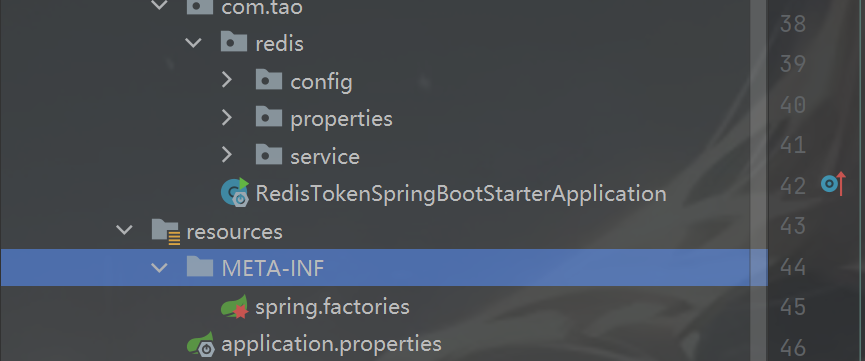
#后面的路径是TokenAutoConfiguration所在的路径
org.springframework.boot.autoconfigure.EnableAutoConfiguration=\
com.tao.redis.config.TokenAutoConfiguration
打包
把项目打成jar发布到maven仓库,可以使用命令行的方式或是IDEA集成MAVEN的功能

测试
新建一个SpringBoot的项目,导入依赖
<dependencies>
<dependency>
<groupId>org.springframework.boot</groupId>
<artifactId>spring-boot-starter-web</artifactId>
</dependency>
<!-- 自定义 starter -->
<dependency>
<groupId>com.example</groupId>
<artifactId>redis-token-spring-boot-starter</artifactId>
<version>1.0.0</version>
</dependency>
<!-- rabbitMq依赖,测试自动配置功能 -->
<dependency>
<groupId>org.springframework.boot</groupId>
<artifactId>spring-boot-starter-amqp</artifactId>
</dependency>
</dependencies>
编写启动类
@SpringBootApplication
public class SpringBootDemoApplication {
public static void main(String[] args) {
ConfigurableApplicationContext context = SpringApplication.run(SpringBootDemoApplication.class, args);
//获取自定义依赖中定义的Service
TokenService tokenService = context.getBean(TokenService.class);
//查看输出
System.out.println(tokenService.getToken());
}
}
执行结果,符合我们自定义starter中 TokenProperties类的默认值
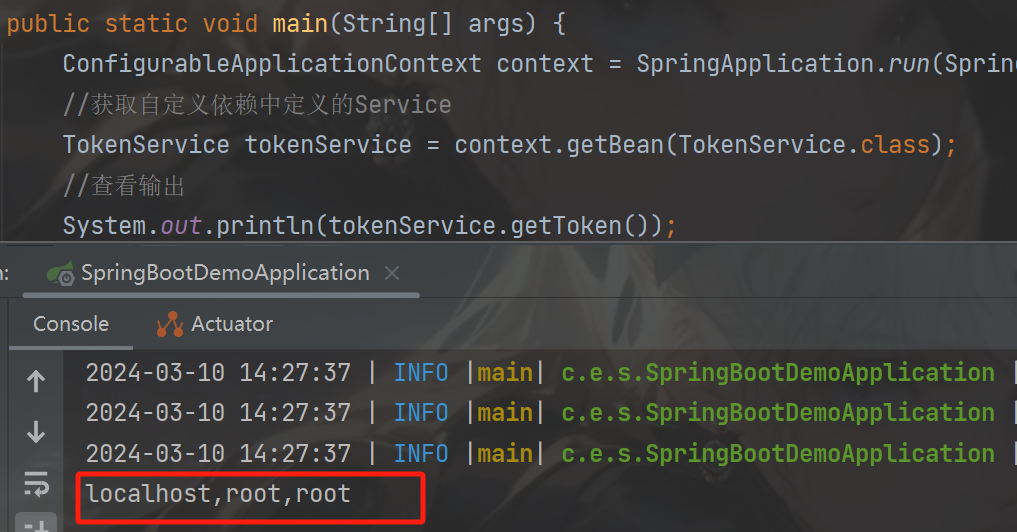
修改yaml文件,测试配置参数是否生效
spring:
application:
name: spring-boot-demo
redis:
token:
redis-host: luochenzz.site
控制台输出如下,没有问题
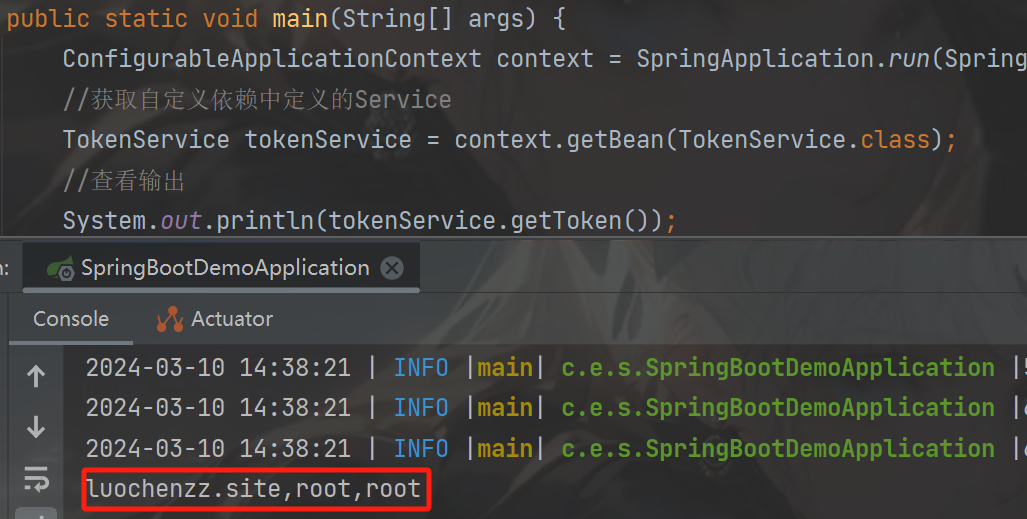
还记得我们怎么定义的starter中的配置类吗?
@Configuration
//条件注解,意味着只有当RabbitTemplate类存在,配置类才会生效
@ConditionalOnClass({RabbitTemplate.class})
@EnableConfigurationProperties(TokenProperties.class)
public class TokenAutoConfiguration {
@Bean
public TokenService tokenService(){
return new TokenService();
}
}
我们前面的pom文件中是导入了rabbitMQ的starter的,现在修改一下pom文件,注释掉相关依赖
<dependencies>
<dependency>
<groupId>org.springframework.boot</groupId>
<artifactId>spring-boot-starter-web</artifactId>
</dependency>
<!-- 自定义 starter -->
<dependency>
<groupId>com.example</groupId>
<artifactId>redis-token-spring-boot-starter</artifactId>
<version>1.0.0</version>
</dependency>
<!-- rabbitMq依赖,测试自动配置功能 -->
<!-- <dependency>
<groupId>org.springframework.boot</groupId>
<artifactId>spring-boot-starter-amqp</artifactId>
</dependency>-->
</dependencies>
启动项目看看结果如何

报异常了 NoSuchBeanDefinitionException ,具体如下:
No qualifying bean of type 'com.example.service.TokenService' available
意思也很简单,就是容器中找不到符合的Bean对象,也就是 TokenService 类没有被实例化。符合我们的预期,当 @ConditionalOnClass({RabbitTemplate.class}) 不满足时,自动配置不会生效
踩坑记录
这里有个大坑!自定义starter打包的时候,最终打出来的包目录是这样的
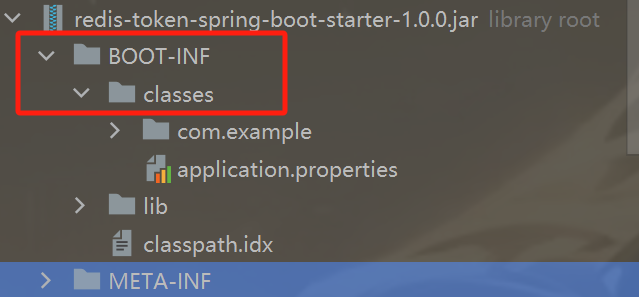
多了两层结构,当你在使用 Spring Boot Maven 插件(或 Gradle 插件)打包 Spring Boot 应用时,生成的 Jar 包通常会包含一个特殊的目录结构,这主要是为了支持 Spring Boot 的“可执行 Jar”特性。这种 Jar 包不仅包含了你的应用代码(在 BOOT-INF/classes 目录下),还可能包含所有必需的依赖库(在 BOOT-INF/lib 目录下,如果你的配置允许打包这些库的话)
最终导致的结果就是项目报红,表示找不到TokenService类!

解决办法很简单,自定义starter的pom文件中,不要添加如下配置,如果有就去掉(使用IDEA创建spring项目默认会添加)
<build>
<plugins>
<plugin>
<groupId>org.springframework.boot</groupId>
<artifactId>spring-boot-maven-plugin</artifactId>
</plugin>
</plugins>
</build>
总结
这篇文章中我们学习了如何自定义springboot starter 并且测试正确,加深了对springBoot的理解,帮助我们更好的掌握它。
